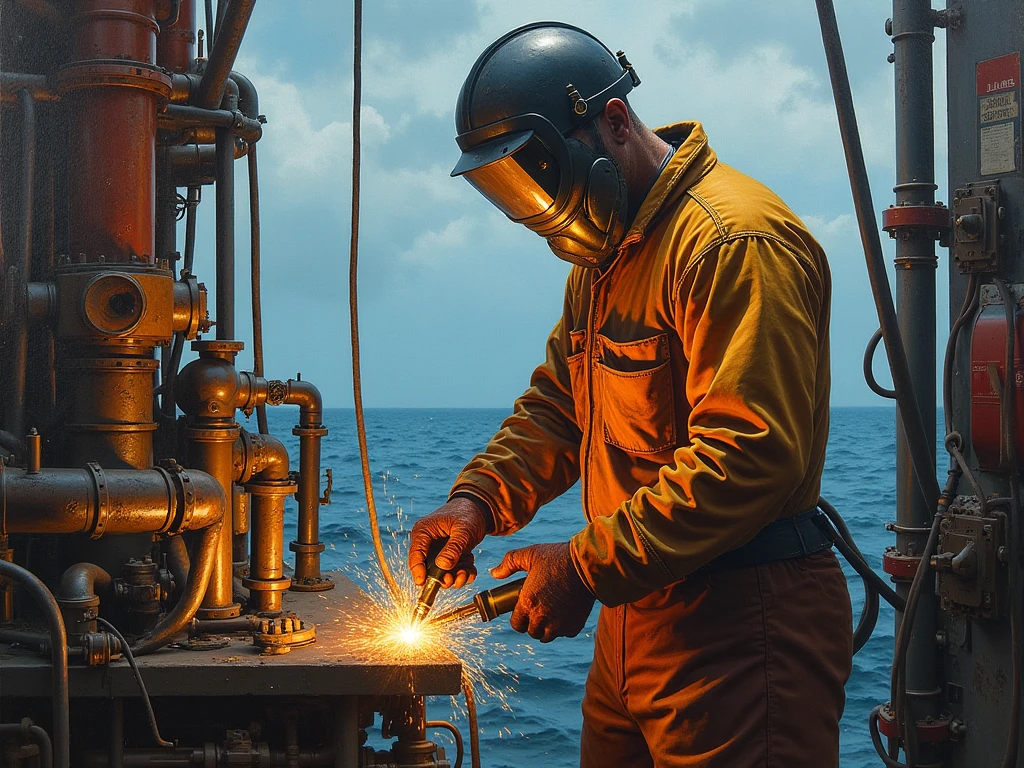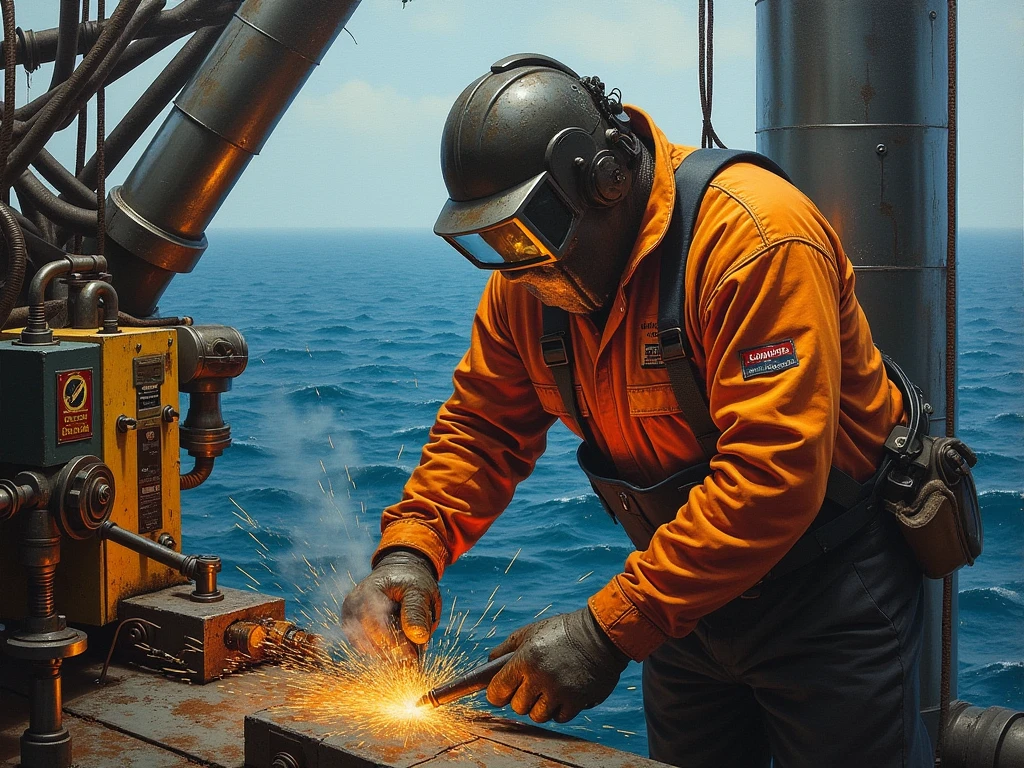
Oil rig welders are highly skilled professionals responsible for performing welding tasks in the challenging and often dangerous environments of offshore oil rigs. They play a critical role in ensuring the structural integrity, safety, and operational efficiency of oil rigs and associated equipment. The unique nature of offshore work demands that these welders are not only experts in their craft but also possess the physical endurance, technical expertise, and safety awareness required to work in harsh conditions.
This article will explore the role of an oil rig welder, the responsibilities and skills required for the job, the challenges they face, and the importance of their work in the oil and gas industry.
The Role of an Oil Rig Welder
An oil rig welder is responsible for welding pipes, structural components, and machinery on an offshore oil rig. These welders work in an environment where their primary task is to join metal components securely and efficiently, ensuring that the equipment remains operational even under extreme conditions. The welding work done on an oil rig involves various techniques, including arc welding, TIG welding, and MIG welding, among others, depending on the materials and the type of repair or construction needed.
Oil rigs are complex and massive structures used for drilling, production, and extraction of oil and natural gas from beneath the seabed. These rigs are exposed to corrosive saltwater, high winds, and extreme weather conditions. They must remain structurally sound to safely house workers and the delicate equipment used in drilling operations. Since maintenance, repairs, and modifications to oil rigs often require precise welding, oil rig welders must adhere to stringent quality control standards to ensure safety and performance.
Responsibilities of an Oil Rig Welder
The specific duties of an oil rig welder can vary depending on the size and type of the rig, but generally, their tasks include the following:
- Structural Welding: One of the main responsibilities of an oil rig welder is the construction, maintenance, and repair of the rig’s structural components. This includes welding beams, supports, and other parts of the rig that maintain its integrity and provide stability in rough seas. The welder must ensure that the connections are strong and able to withstand the stresses encountered by the rig during operation.
- Pipeline Welding: Oil rigs often rely on extensive pipeline systems to transport oil and gas from the wellhead to storage tanks or ships. Welders on oil rigs are responsible for joining and repairing these pipelines, ensuring that the connections are leak-proof and structurally sound. This is especially crucial in high-pressure systems, where even a small defect could lead to dangerous leaks or explosions.
- Maintenance and Repairs: Over time, various parts of an oil rig can suffer wear and tear due to constant exposure to harsh elements, corrosion, and mechanical stress. Oil rig welders are responsible for performing repairs and replacements on the rig’s machinery, equipment, and infrastructure. This includes welding damaged or corroded areas of the rig, such as the deck, piping, and tanks, to restore them to full functionality.
- Fabrication: In addition to repairs, oil rig welders may be required to fabricate new components, parts, or equipment to suit specific needs on the rig. This may involve reading blueprints or technical drawings and then using welding equipment to create custom parts that fit the exact specifications required for the rig’s operation.
- Safety Inspections: Oil rig welders must regularly inspect their work and ensure it meets safety standards. This includes conducting non-destructive testing (NDT) to check the integrity of welds, such as ultrasonic or x-ray testing, to detect any internal defects. If any issues are found, they must be addressed immediately to avoid compromising the rig’s safety.
- Collaboration and Communication: Welders on oil rigs work as part of a team with other tradespeople, such as pipefitters, electricians, and mechanical engineers. Effective communication is essential to ensure that everyone is on the same page regarding the welding requirements and safety protocols. Welders must also report on the progress of their work and any issues they encounter.
Skills Required to Be an Oil Rig Welder

Oil rig welding is a highly specialized job that requires a combination of technical skills, physical stamina, and a commitment to safety. Below are some of the key skills that an oil rig welder must possess:
- Welding Expertise: A deep understanding of welding processes and techniques is the foundation of an oil rig welder’s role. This includes knowledge of various welding methods, such as MIG (Metal Inert Gas), TIG (Tungsten Inert Gas), and stick welding (SMAW), as well as the ability to select the right welding method for different materials (such as steel, stainless steel, or aluminum) and tasks.
- Mechanical and Technical Knowledge: Oil rig welders need to have a solid understanding of the mechanical systems and structures they are working on. This includes reading and interpreting blueprints and technical drawings, as well as understanding the machinery and equipment used in oil rig operations. Welders must be able to troubleshoot mechanical issues and know when repairs or replacements are necessary.
- Physical Strength and Endurance: Working on an oil rig requires a significant amount of physical labor. Oil rig welders often work in confined spaces, at great heights, and in challenging environmental conditions, such as extreme temperatures or rough seas. As such, welders must possess excellent physical stamina and strength to perform the job safely and effectively.
- Attention to Detail: Precision is key in welding, and oil rig welders must be highly detail-oriented to ensure the quality and integrity of their welds. A small mistake can lead to catastrophic failure, so it’s crucial that welders pay close attention to every aspect of the welding process, from selecting materials to inspecting the finished welds.
- Safety Awareness: Safety is one of the most critical aspects of working on an oil rig, given the hazardous environment and the potential dangers involved in welding, such as exposure to fire, fumes, and high-pressure systems. Oil rig welders must be familiar with safety protocols, including wearing the appropriate personal protective equipment (PPE) and following industry regulations for safe welding practices.
- Problem-Solving Abilities: Oil rigs can be unpredictable environments, and welders often need to think on their feet and solve problems quickly. Whether it’s figuring out how to access a difficult-to-reach welding area or dealing with a sudden equipment malfunction, welders need to be resourceful and adaptable to handle challenges as they arise.
Challenges Faced by Oil Rig Welders
Working as an oil rig welder comes with a unique set of challenges, some of which include:
- Harsh Working Conditions: Oil rig welders work in environments that are often far from ideal. Whether they are dealing with the extreme heat of welding equipment or the cold, wet, and windy conditions on an offshore rig, they must be prepared to work in these challenging conditions day in and day out. The work is physically demanding, and the isolation of offshore rigs can also make the job mentally exhausting.
- Safety Risks: Welding on an oil rig involves working with high-temperature equipment, flammable materials, and high-pressure systems. Even the smallest mistake can lead to dangerous consequences, such as fires, explosions, or structural failure. Welders must remain vigilant and adhere to strict safety guidelines to protect themselves and their colleagues.
- Long Hours and Remote Locations: Oil rig welders often work long shifts, sometimes up to 12 hours a day, and may spend weeks or months at a time on offshore rigs, with little contact with family or friends. This isolation can be mentally challenging, but it is a necessary part of the job for those who wish to work in this industry.
- Physical Demand: The physical demands of the job can be exhausting. Welders must often work in awkward positions or confined spaces, lift heavy equipment, and endure long hours of physical activity. This can take a toll on the body, especially over long periods.
Conclusion
Oil rig welders are essential members of the offshore oil and gas workforce. Their ability to perform precise welding tasks in harsh and often dangerous conditions ensures the safety and efficiency of offshore rigs, which are vital to the global energy sector. The job requires a high level of skill, physical endurance, and safety awareness, as well as the ability to adapt to ever-changing and challenging environments.
Despite the tough conditions, many welders find working on oil rigs to be a rewarding career, offering competitive pay, travel opportunities, and the chance to be part of a critical industry. For those with the right skills and mindset, oil rig welding can be a fulfilling and high-paying profession, contributing to the continued success and safety of offshore oil and gas operations worldwide.